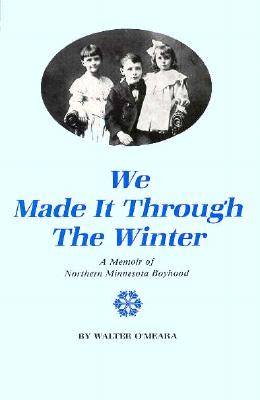In this delightful memoir, O’Meara recounts a ten-year-old boy’s year in the northern Minnesota sawmill town of Cloquet at the turn of the twentieth century. A talented historian/novelist, he vividly evokes the sights and sounds, joys and sorrows of family life set against the background of the lumbering industry when white pine was still king.
Season by season, O’Meara evokes the sights and sounds of family life and work in an era when the crisp days of autumn meant "digging in," and when it was up to the boy in the family to stack firewood for the kitchen range and dig enough potatoes "to last until the return of spring." The author’s words recreate the bone-chilling cold of a Minnesota winter when a boy snared rabbits to help supply the family table, when "your ears could freeze to a dead, marble-like whiteness after only a few minutes of exposure," and when a boy’s father was gone "up in the woods" to work in one of the forty-odd logging camps near Cloquet. The arrival of spring was marked by his father’s return from the camps while summer meant bare feet, the "noisy frontier exuberance" of the Fourth of July, and summer visitors--gypsies, traveling circuses, and chimney sweeps.
A talented historian/novelist, O’Meara vividly evokes the sights and sounds, joys and sorrows of family life set against the background of the lumbering industry when white pine was still king.
| FindBook |
有 1 項符合
We Made It Through the Winter: A Memoir of Northern Minnesota Boyhood的圖書 |
 |
We Made It Through the Winter: A Memoir of Northern Minnesota Boyhood 作者:O’Meara 出版社:Minnesota Historical Society Press 出版日期:1987-04-15 語言:英文 規格:平裝 / 128頁 / 21.6 x 14 x 1 cm / 普通級 |
| 圖書館借閱 |
| 國家圖書館 | 全國圖書書目資訊網 | 國立公共資訊圖書館 | 電子書服務平台 | MetaCat 跨館整合查詢 |
| 臺北市立圖書館 | 新北市立圖書館 | 基隆市公共圖書館 | 桃園市立圖書館 | 新竹縣公共圖書館 |
| 苗栗縣立圖書館 | 臺中市立圖書館 | 彰化縣公共圖書館 | 南投縣文化局 | 雲林縣公共圖書館 |
| 嘉義縣圖書館 | 臺南市立圖書館 | 高雄市立圖書館 | 屏東縣公共圖書館 | 宜蘭縣公共圖書館 |
| 花蓮縣文化局 | 臺東縣文化處 |
|
|
圖書介紹 - 資料來源:博客來 評分:
圖書名稱:We Made It Through the Winter: A Memoir of Northern Minnesota Boyhood
內容簡介
|











